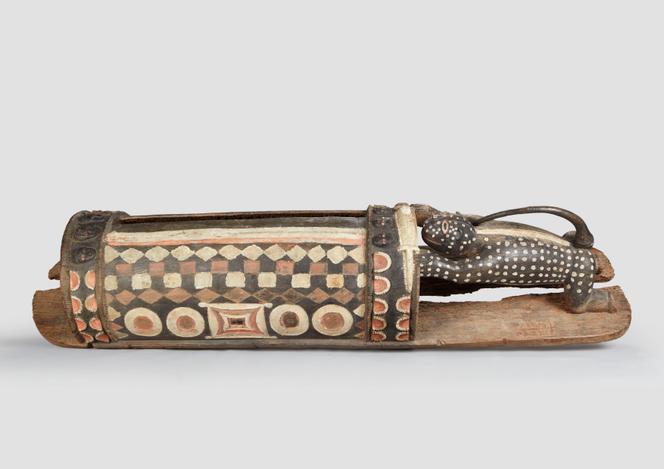


Côte d'Ivoire has been waiting two years for the return of the Djidji Ayôkwé, nicknamed the "talking drum," whose return it called for in 2019. For two years already, this imposing instrument, weighing 430 kilos and measuring 3 meters in length, has been laying dormant in the reserves of the Musée du Quai Branly in Paris, after being restored with the aim of being transferred. Confiscated in 1916 by the French army from the Ebrié community, the Djidji Ayôkwé was to have been the very first beneficiary of the framework law accelerating the restitution of works of art looted in Africa during the colonial era. However, the legislation was postponed, and on Monday, November 18, French Culture Minister Rachida Dati and her Ivorian counterpart Françoise Remarck signed a simple agreement to "deposit" the precious object at the Musée des Civilizations de Côte d'Ivoire in Abidjan.
During a 2017 speech in Ouagadougou, the capital of Burkina Faso, President Emmanuel Macron nonetheless pledged to make it possible within five years to restitute objects unduly entered into public collections. A bill was drafted in 2023 by the previous culture minister, Rima Abdul Malak. However, the Council of State, which advises the government in drafting legislation, noted a legal flaw that risked restricting its scope, as Le Monde revealed in February. In the eyes of the councilors, the reasons for restitution cited in the text, namely "the conduct of international relations and cultural cooperation," do not justify a departure from the provisions of French law declaring cultural property entered into public collections by gift or bequest to be inalienable.
In itself, this legal hurdle is not insurmountable. It would suffice to include a "compelling reason" or "overriding general interest" in the bill, as was the case for the framework law on the human remains and property of people looted under the Occupation, passed by Parliament in 2023. But the bill makes no mention of the colonial context, even though the majority of the objects being reclaimed originated there.
The reformulation of the text, as well as its examination by Parliament, have since been postponed indefinitely. "Rachida Dati hasn't grasped the issues of memory and history raised by such a law, because it's of no political interest to her," said Communist Senator Pierre Ouzoulias, a member of the Sénat's Culture Committee.
You have 39.8% of this article left to read. The rest is for subscribers only.
